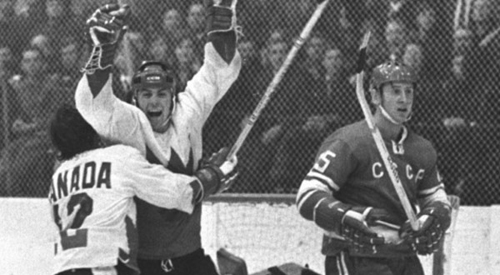
What Canadians talk about when remembering ’72
The images are frozen into the collective memory: Paul Henderson, slipping and crashing into the boards behind the Russian net. It is last of an eight game series, each team has won three games and one ended in a draw. And as Henderson scrambles back to his feet, Canada is watching.
Even now, 40 years after game eight, the game still has a cultural cache unlike anything else in Canadian sports history. Books have been written about this series; documentaries filmed in both countries. There’s a movie starring comedian Gerry Dee as Wayne Cashman. The team gets a star on the Walk of Fame. This was more than hockey.
But when we talk about the series on its anniversary, what are we really saying? The series stands for more than hockey. But what does it truly stand for?
The elephant in the room with most of Canada’a important international hockey games is how they team was never above gooning it up. In 1972, Bobby Clarke hit Valeri Kharlamov in the ankle with a stick. In 1987, Dale Hawerchuk hauled down a Soviet player with his stick to give Gretzky and Lemieux a breakaway in overtime of game three. Never forget: when the good guys thought nobody was looking, they put sand in the ointment. But this doesn’t fit the narrative, so it’s glossed over. When Henderson called the slash the low point of the series, he later apologized.
Paul Henderson’s NHL career lasted from 1963 to 1980, some 700 NHL games and 300 more in the WHA. He scored more than 30 goals just twice in that period, the same number of seasons he had 60-plus points. Statistics are not too kind to Henderson: Hockey-Reference’s similarity scores rank him among John Anderson, Fred Stanfield and Gary Dornhoefer. Nobody’s ever suggested those are Hall of Fame players. And none are present in the Hall.
But Henderson’s name comes up for consideration every few years. Does a single goal (or three) make him that memorable? What are we talking about when we talk about that goal?
[php snippet=1]
A goal is a goal, but not all goals are scored equal, if that makes sense. For example, when Montreal beat Boston in game seven of the 1979 Conference Finals, it was on an overtime goal by Yvon Lambert. But the goal everyone remembers is Guy Lafleur’s, which simply tied the game. His is the one stuck in our collective craw. It’s the same thing with Henderson’s goal. It’s only a goal, equivalent to one of about 400 or so he scored during his NHL years. It’s an important and memorable goal, which is exactly how the argument against Henderson in the Hall works.
But when you argue his case, you’re not just arguing about the NHL. It’s an argument about international hockey and succeeding on the biggest stage. It’s the Hockey Hall of Fame, not the NHL Hall. That’s why Kharlamov is in. Arguing against Henderson is an argument against hockey played outside North America: it doesn’t matter as much. Yes, Henderson’s numbers don’t stand among even the weaker members of the Hall, but that’s beside the point. The Hall lists the following attribute under the player category: “their contribution… to the game of hockey in general.” Henderson’s goal was the cap to a series that put international hockey more or less on the map.
It’s a role similar to the one the U.S. 1980 Men’s Hockey team has: what Henderson’s goal did for Canada, Mike Eruzione’s did for the United States. Each of those two fill the same role in their respective countries: each beat up on the Russians, won a game which was almost immediately politicized and is disrespected by the other nation.
In his 2007 book, “McCown’s Law,” Bob McCown argued over which team – Canada from ’72 or the U.S. from ’80 – would win, if they played each other. The answer was just as banal as the question: in a series, Canada, in a single game where everything went the right way, Team USA. His conclusion is the legacy of Team Canada in a nutshell: they were good once they got going, but no single win of theirs was as important as the 1980 Olympic win was.
The thing is, one doesn’t have to mean something more than the other. In Canada, nearly everyone who was around in 1972 has something to say about it: in the same week, everyone from Bill Brioux to Norm MacDonald have weighed in on where they were. In eight years, we’ll see the same from south of the border. More than anything else, these memories are the legacy of the Summit Series. When we talk about 1972, we’re really talking about ourselves.
[php snippet=1]

